by Michael Cropper | Jun 14, 2011 | Thoughts |
With all of the changes and announcements from Google recently it appears they are heading in a completely different direction than their core business, search. Since Google began, it has always been about providing the best results to the users via their SERPs. They tried to give the user the choice of 10 organic (give or take) results based on a complex algorithm of hundreds of signals. They even wanted webmasters to get involved by making content more ‘readable’ to Google, which I guess is why the SEO industry was born.

Recently though Google seem to be steering away from this and thinking ‘Google knows best’. They now seem to be heading towards providing users choices based not on their normal SERPs, but choices via their own Google products. This is a very worrying direction since once they create a product and effectively force users to use this by prominently positioning it in the SERPs then this flushes all competition down the drain.
Lets take a look at a few of the recent developments from Google.
Google Advisor
Google Advisor which is a financial comparison tool comparing mortgages, credit cards and savings accounts.

This seems like a direct attack on the financial services industry and more importantly the rise of the recent price comparison monster websites. Should Google really be providing the same service as price comparison websites here? I don’t believe so as this is no longer about providing the ‘right’ results to the user, it is about pricing the competitors out of the market. Since Google doesn’t (at the moment) take any commissions on these products being offered, this could push out the price comparison websites who do take a commission – especially if Google begin to prioritise their own products in the SERPs.
Google Flight Comparison
Google Flight Comparison in the SERPs is Google’s latest brainwave which shows flight comparison information to ‘make it easier for users to understand’.
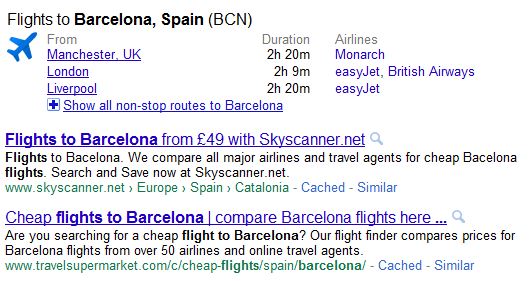
Seems like a good idea at first, and I know first hand that flight websites are some of the most confusing when coming to make a purchase. But looking at this closer, you can see that all of the comparison websites are now further down the listings in favour of Google’s own products! When did it become Google’s job to make things like this easier? Surely this is the job of the actual flight comparison websites and the flight companies their self, since they do have enough incentive to do this….better usability equals more sales.
Google Local
Now we get on to Google Local which includes the 7-pak results and the local listings mingled in within the SERPs. If we take a look at the listings shown for the search term “Manchester Hotels” then we can see thateverything above the fold is either sponsored listings or Google’s own products.
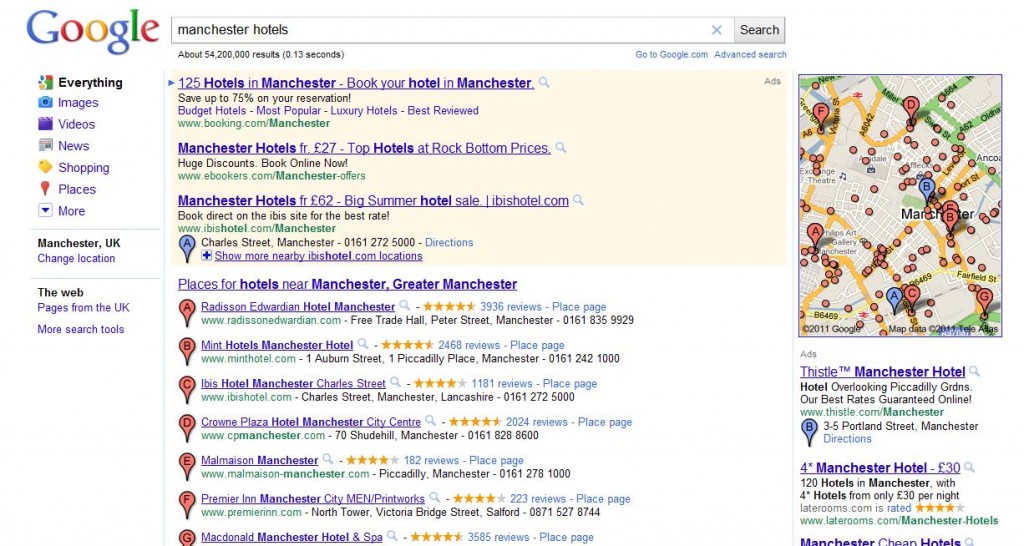
But wait, Google recently said that we should be focusing on quality content, making our websites the top source of information within the industry. And quoting the guidelines from Google directly
“Does this article have an excessive amount of ads that distract from or interfere with the main content?”
Is Google ignoring its own guidelines again…..? This whole scenario is causing lost business for the smaller companies who cannot afford the sponsored listings and lets be fair, the Google Places listings are more of a bonus than a real listing.
Google Mobile Wallet
Next we are looking at the latest Google Mobile Wallet which is offering a Paypal style payment system which is via your mobile phone, the only difference being is that Google Mobile Wallet is free! Does this mean that people will slowly move away from Paypal or maybe even moving further away from traditional credit cards?

This would no doubt all link in nicely with the Google Advisor tool mentioned above within the next few years.
Google Offers
Google’s latest product is Google Offers which seems to be attacking Groupon and other offer websites. Quite fitting really since in the latest algorithm update by Google, Panda, was actually attacking websites like this!
 This seems like the good old business plan behind Tesco in the UK. Build lots of large retail outlets and offer cut price goods which forces all of the smaller retailers out of business. Then once all of the smaller retailers are forced out of business because they cannot compete in the market, Tesco opens up some Tesco Express stores to fill the new gap in the market and totally dominating the market place.
This seems like the good old business plan behind Tesco in the UK. Build lots of large retail outlets and offer cut price goods which forces all of the smaller retailers out of business. Then once all of the smaller retailers are forced out of business because they cannot compete in the market, Tesco opens up some Tesco Express stores to fill the new gap in the market and totally dominating the market place.
Conclusion
It is certainly interesting looking at all of these new developments from Google and how they may all link together. Google already dominate a massive market and it seems they are going after everyone else now too….
Watch this space…
by Michael Cropper | Jun 14, 2011 | SEO, Social Media |
Twitter announces the new follow button, Google announces the launch of their +1 button, we already have the ability for a Facebook Like button and we have the fantastic AddThis too.
This seems like an awful lot of buttons to me – but I do believe there is a benefit to each of them (well most) if used correctly.
The new Twitter one-click-to-follow button is a great opportunity to get more people following you on twitter as it cuts out one of the steps required to follow. Previously people had to click from your site though to your twitter page, they then had to click to follow you. This seems like a small difference but I believe it is an important one, the easier you make it for people to do something then the more likely it is that they will do it.
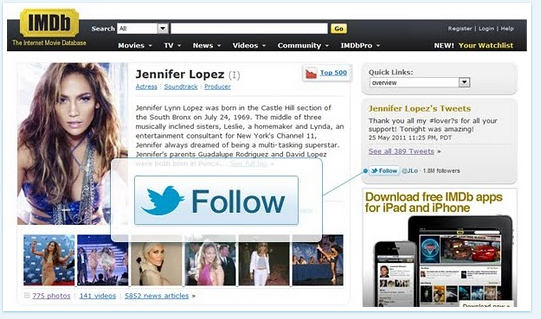
The Facebook Like button has been around for a while and the benefits are phenomenal when incorporating this. The summary of the Like Button means that all of your website is now part of Facebook’s social graph, meaning that your pages can be found if people search for certain things via the Facebook search box (as long as the page has been shared at least once). You then get access to lots of cool information about this user which can be used to personalise pages and show which of their friends also like this page/item/category etc.

The AddThis plugin in my opinion is the best thing since sliced bread. It incorporates all of the main social media websites, it automatically orders the list of sharing buttons based on the individual users preferences if they have use it before (or ordered by global popularity if user has never used AddThis). What a great tool and we all know as SEOs that the more shares/tweets/links generated then the better your site will rank in the SERPs.

Regardless of any SEO benefit here though, it is still the right thing to do when encouraging more people to share your content as this is the modern day word-of-mouth. This is real people sharing this content/product with their real friends and associates.
Now the only odd one in the list above is the new Google +1 button. When did Google decide this was a good idea? Why did Google decide this was a good idea? I can totally understand this from a data collection point as this data can be used to personalise a users search results based on the websites they like (which IMO isn’t likely to work as well as Google would like). The data can also be used as great information to personalise the sponsored adverts too. But I am yet to be convinced of the true value for the user behind this – only time will tell I guess.
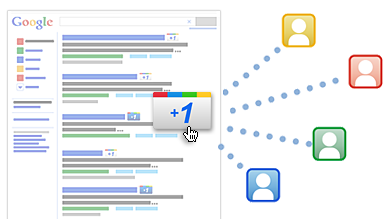
Currently the plus 1 button requires a separate install as it is not yet bundled within the main AddThis button. When I asked AddThis when this would be available, they were unsure of a timescale for this.
In the mean time though whilst I wait for some more information about this button and how successful / unsuccessful it turns out to be, I may install it and give it a go!
by Michael Cropper | May 14, 2011 | Thoughts |
As some of you may have noticed the new search results Google is testing today. Whether you love or hate them, doesn’t really matter – Google is doing it and we have to adapt if they do roll this out for everyone at a later date. Below is a search for the phrase London Hotelson Google.co.uk which shows the new layout.
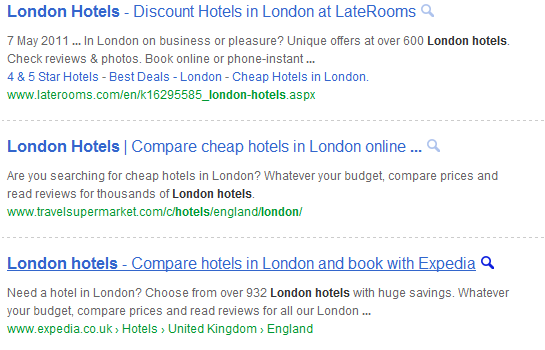
Now these results alone are not the main issue for me, it is how they have also expanded the width of their sponsored results too. Which means that there are now no organic results at all above the fold of the page with my screen resolution set as 1366 x 768.
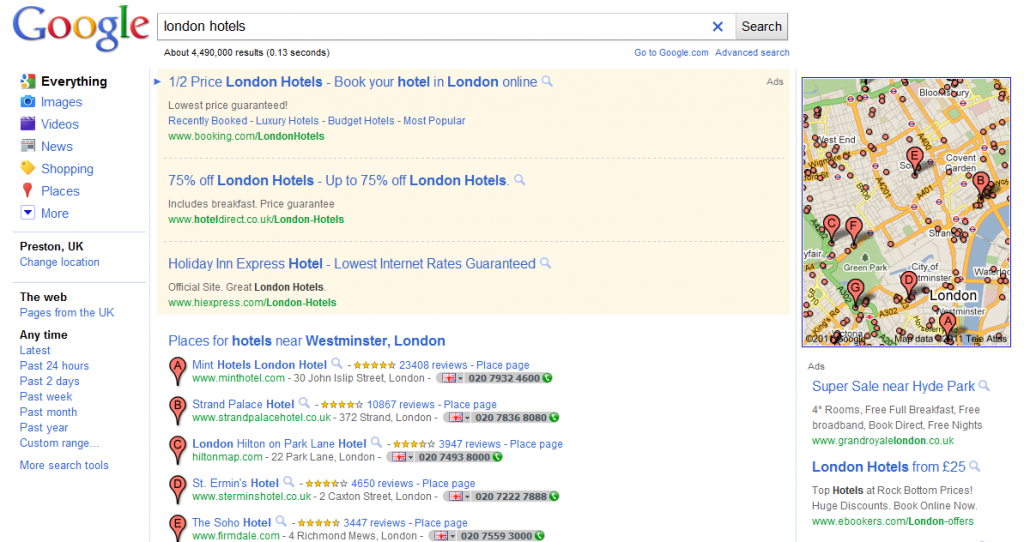
Baidu is China’s main search engine with around a 67% market share (Google has around 16% in China). Baidu has no shame in admitting they are wanting as much money as possible from adverts which is why up to 80% of Baidu’s SERPs can be either paid/sponsored listings or Baidu’s own services (such as its own versions of Wiki, Yahoo Q&A, Forums etc)
When you look at the Baidu search results for the phrase “Beijing Hotels” in Simplified Chinese, you will also notice that there are absolutely no organic listings above the fold too.
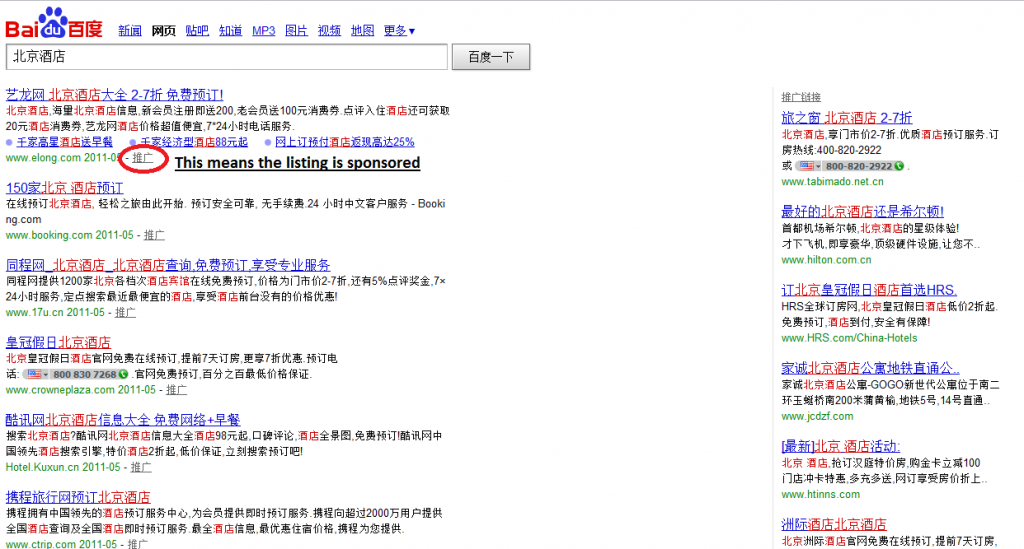
Is Google putting more weight towards the financial gains within markets where they totally dominate? It would certainly make sense, since there is a finite amount of searches that happen daily and if they dominate the search engine market within a certain country then they may as well get more money from these queries.
Although, what happened to all that “its all about the user”? I am not convinced seeing less results above the fold is better for the user. I like choice, I want to see a selection of results which I can choose based on what I am really looking for, not what Google thinks I am looking for.
by Michael Cropper | May 14, 2011 | News, PPC, SEO |
As I am sure anyone in the SEO game is familiar with the Google AdWords Keywords Tool that shows the popularity of various search terms. What you may not be aware of is the cheeky actions Google is doing for people arriving at the keyword tool from Bing.
So here is the normal actions for when you arrive at the Keyword Tool from the Google SERPS and search for “Broad Match” information
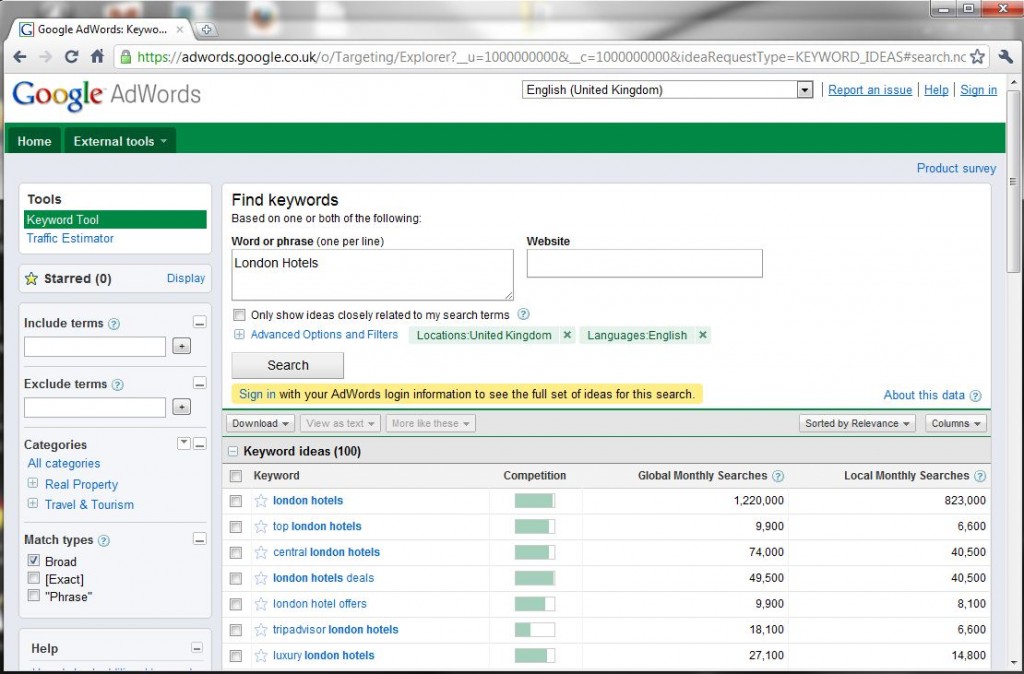
Then when you select the “Exact Match” (aka, useful information) you get to see the data that can be acted upon
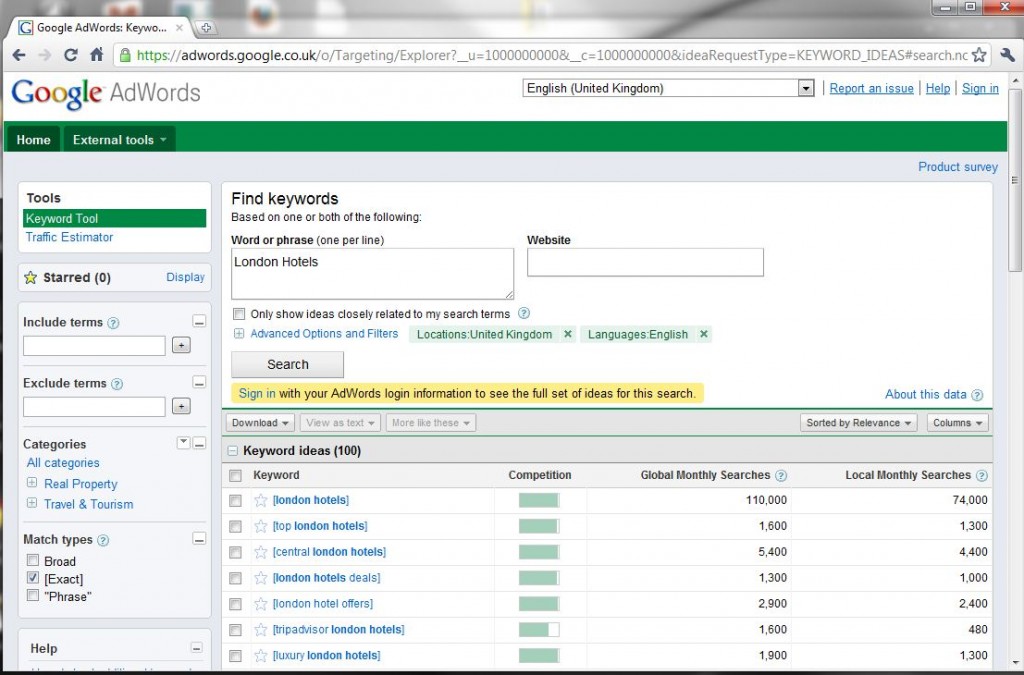
Now when you try and repeat the above process when entering the keyword tool from Bing’s SERPs you get an all together different result.

Then when arriving at the tool, everything seems normal to begin with when the default match type is set to “Broad” (aka, worthless data).
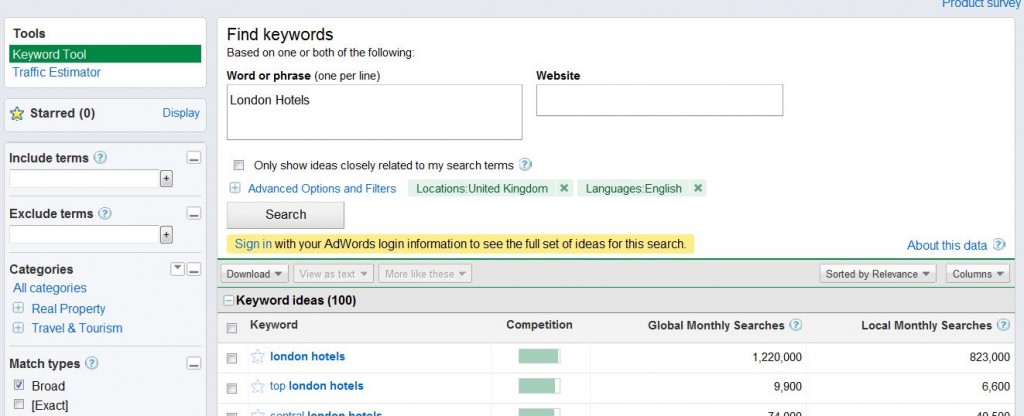
Now the interesting part comes when selecting to view all of the information on the “Exact Match” type
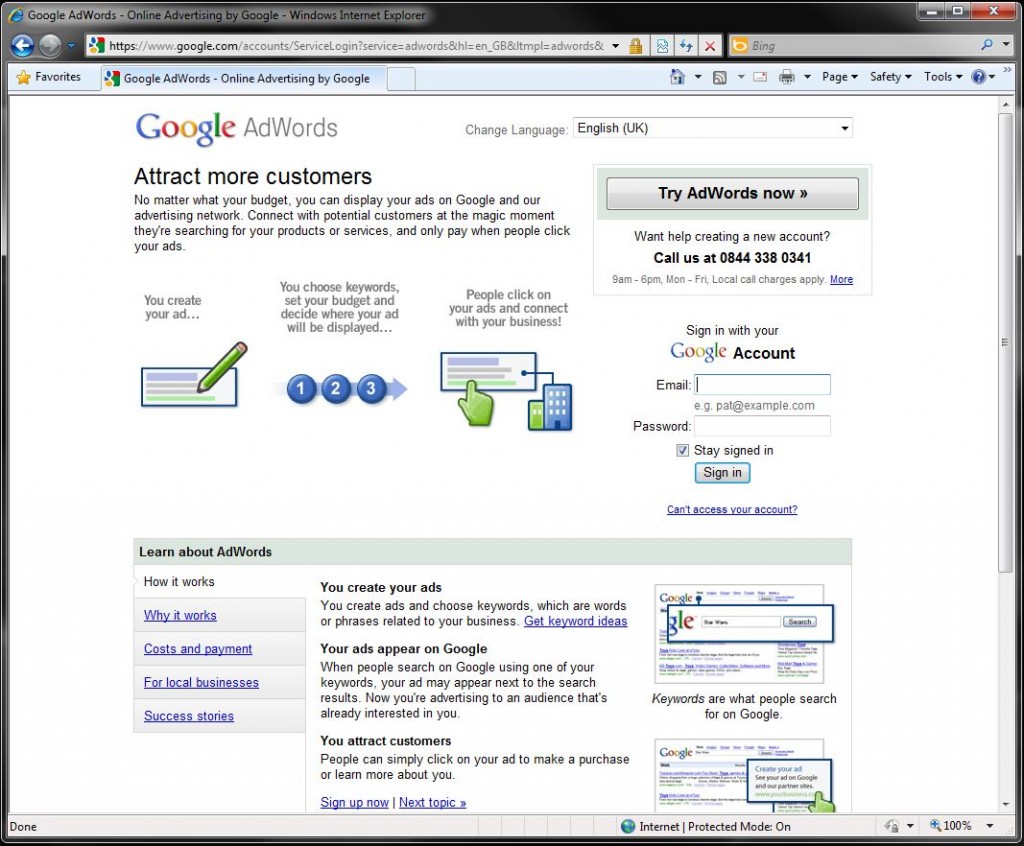
Yes that’s right, Google is doing a cheeky redirect to users who are arriving at the keyword tool form Bing. Google is forcing Bing users to sign up with Google AdWords to view the same information that is publicly available when arriving at the tool from the Google SERPs.
Is this right for Google to be doing this? Who knows. But they are and I am sure they will have some metrics which show how effective this has been. Maybe Bing should remove this URL from their SERPs in response to this? Seems crazy how Bing would be showing results for their competitors advertising platform, when instead they could promote their own better.
by Michael Cropper | May 14, 2011 | Thoughts |
If ever there was a reason needed to not rely on external information for business, this is one – Google Deprecating APIs
Have these affected your business? This is going to affect an awful lot of people, and looking at some of the 158 comments already on the official blog post from Google, this is not going down well….
That said though, any serious business should never be relying on external companies / data / APIs for any critical systems. Now I can totally see the power of API’s and I absolutely love them, but for any core business needs it can be a little like putting all of your eggs in one basket.
Unfortunately for many large organisations this always seems to be the route taken, the easiest and quickest route which rarely has the long term benefits. My philosophy is always to do something right from the beginning as this saves countless hours in the long run.
As for the Google API’s, well there are still a lot more available to use for the foreseeable future. For the API’s being deprecated I can foresee a lot of further abuse of these prior to these being shut down, such as using the services and storing the information which in most cases in against the guidelines of the services.
Well for now, time to build something more robust in-house – Maybe a scraper which accomplishes the same task 
 This seems like the good old business plan behind Tesco in the UK. Build lots of large retail outlets and offer cut price goods which forces all of the smaller retailers out of business. Then once all of the smaller retailers are forced out of business because they cannot compete in the market, Tesco opens up some Tesco Express stores to fill the new gap in the market and totally dominating the market place.
This seems like the good old business plan behind Tesco in the UK. Build lots of large retail outlets and offer cut price goods which forces all of the smaller retailers out of business. Then once all of the smaller retailers are forced out of business because they cannot compete in the market, Tesco opens up some Tesco Express stores to fill the new gap in the market and totally dominating the market place.

















Google needs to be broken up. They have too much power. I intend to request any and all U S government documents involving Google under the Freedom of Information Act and see what I can find. I think Google may be guilty of fraud in their use of Moffett Field to house their fleet of private jets. I have won about 30 Freedom of Information Act cases against the federal government. They may owe hundreds of millions if not billions in damages.
Sounds exciting Lloyd, do keep me posted